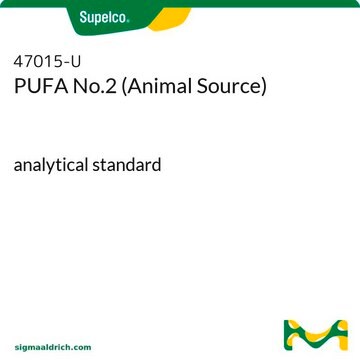About This Item
Recommended Products
grade
analytical standard
Quality Level
Assay
≥99.0% (GC)
shelf life
limited shelf life, expiry date on the label
technique(s)
HPLC: suitable
gas chromatography (GC): suitable
bp
236 °C/100 mmHg (lit.)
mp
41-42 °C (lit.)
42-44 °C
format
neat
functional group
carboxylic acid
shipped in
ambient
storage temp.
room temp
SMILES string
CCCCCCCCCCCCC(O)=O
InChI
1S/C13H26O2/c1-2-3-4-5-6-7-8-9-10-11-12-13(14)15/h2-12H2,1H3,(H,14,15)
InChI key
SZHOJFHSIKHZHA-UHFFFAOYSA-N
Looking for similar products? Visit Product Comparison Guide
Application
- analysis of pentaerythritol, phthalic acid and triglycerides in extracts from industrial alkyd resins using gas chromatography and high-performance liquid chromatography coupled to mass spectrometry
- quantification of metabolites of arachidonic acid from cultures of endothelial cells using high performance liquid chromatography coupled to mass spectrometry
Recommended products
Signal Word
Warning
Hazard Statements
Precautionary Statements
Hazard Classifications
Eye Irrit. 2 - Skin Irrit. 2 - STOT SE 3
Target Organs
Respiratory system
Storage Class Code
11 - Combustible Solids
WGK
WGK 3
Flash Point(F)
235.4 °F - closed cup
Flash Point(C)
113 °C - closed cup
Personal Protective Equipment
Choose from one of the most recent versions:
Already Own This Product?
Find documentation for the products that you have recently purchased in the Document Library.
Customers Also Viewed
Our team of scientists has experience in all areas of research including Life Science, Material Science, Chemical Synthesis, Chromatography, Analytical and many others.
Contact Technical Service












